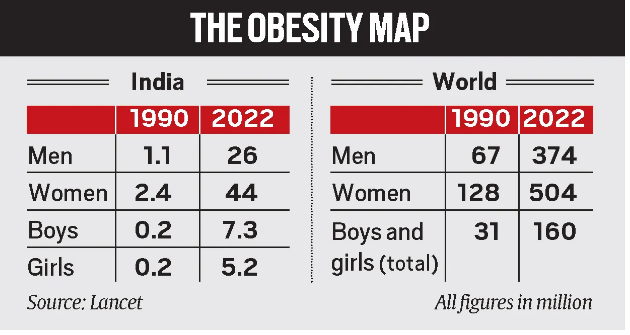ForumIAS announcing GS Foundation Program for UPSC CSE 2025-26 from 19 April. Click Here for more information.
ForumIAS Answer Writing Focus Group (AWFG) for Mains 2024 commencing from 24th June 2024. The Entrance Test for the program will be held on 28th April 2024 at 9 AM. To know more about the program visit: https://forumias.com/blog/awfg2024
Source-This post on Lancet study on Global Obesity rates is based on the article “Obesity rates going up across the world: Lancet study” published in “The Hindu” on 29th February 2024.
Why in the News?
According to Lancet study on Global Obesity rates, the obesity rates among children and adolescents worldwide have increased four times from 1990 to 2022. Meanwhile, obesity rates among adults have more than doubled.
What are the key findings of the Study?

Study conducted by– NCD Risk Factor Collaboration (NCD-RisC), in collaboration with the World Health Organization (WHO).
Note– NCD Risk Factor Collaboration (NCD-RisC) is a global network of health scientists offering thorough and prompt data on risk factors for non-communicable diseases (NCDs)
Worldwide Figures– More than one billion people worldwide are living with obesity. Specifically, in 2022, there were 159 million children and adolescents, as well as 879 million adults, who were obese.
India’s findings
1. Children and adolescents– The obesity rate for girls rose from 0.1% in 1990 to 3.1% in 2022, while for boys, it increased from 0.1% to 3.9%.
Note– In terms of obesity rates among girls and boys, India ranked 174th globally in 2022.
2. Adults– Among women, the obesity rate surged from 1.2% in 1990 to 9.8% in 2022, while among men, it rose from 0.5% to 5.4%.
Methodology used:
a. More than 1,500 researchers from 190+ countries analyzed weight and height data from over 220 million individuals aged five and older.
b. They used body mass index (BMI) to study global changes in obesity and underweight from 1990 to 2022.
Significance of the study:
a. This discovery is important given India’s existing high rates of non-communicable diseases, including heart disease, strokes, and diabetes.
b. Obesity significantly increases the risk of developing these diseases, including Type 2 diabetes in teenagers, at an early age.
Note– Obesity, as per the World Health Organization (WHO), refers to an excessive accumulation of fat that can be harmful to health. A body mass index (BMI) over 25 is considered overweight, and over 30 is classified as obese.
UPSC Syllabus- Reports & Indices/Science & Technology




